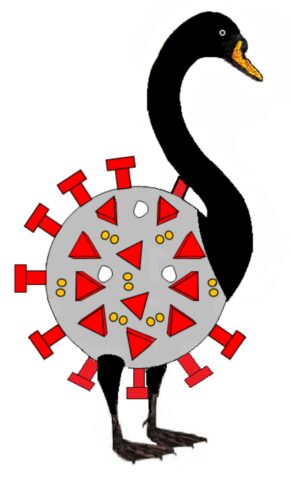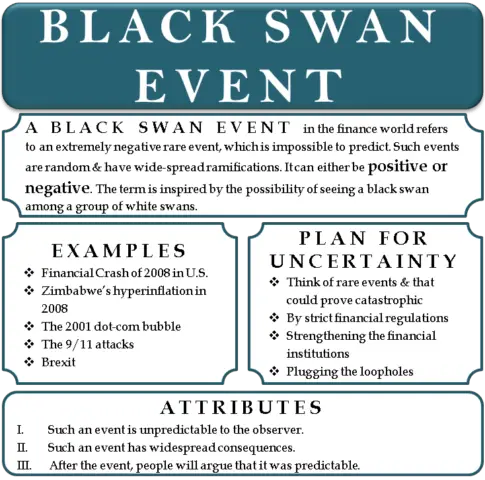What do the emergence of the internet, the attacks of September 11, 2001, and the economic crisis of 2008 have in common? They were extremely rare and surprising events that had a severe impact on history. These types of events are often called “black swans.” Some argue that the recent Covid-19 pandemic could also be considered one of them, but not all agree.
The ‘black swan theory’ was developed by Lebanese-American professor, writer, and ex-trader Nassim Taleb in 2007. And it has three components, as Taleb himself explained in an article in The New York Times that same year:
– First it is somewhat atypical, as it is outside the realm of usual expectations, because nothing in the past can point convincingly to its possibility.
– Second, it has an extreme impact.
– Third, despite its atypical status, human nature makes us invent explanations for its occurrence after the fact, making it explainable and predictable.
Taleb’s thesis is generally associated with economics, but it applies to any area. And since the consequences are often catastrophic, it is important to assume that the occurrence of a “black swan” event is possible, so you have to have a plan to deal with it. In short, the “black swan” represents a metaphor for something unpredictable and very strange, but not impossible.
Why are they called that?

At the end of the 17th century, European ships embarked on the adventure of exploring Australia. In 1697, while navigating the waters of an unknown river in the southwest of Western Australia, the Dutch captain Willem de Vlamingh sighted several black swans, possibly the first European to observe them.
As a consequence, Vlamingh named the river Zwaanenrivier (Swan River, in Dutch) because of the large number of black swans that were there. It was an unexpected, novel event. Until then science had only recorded white swans.
The first known reference to the term “black swan” associated with the meaning of rarity comes from a phrase by the Roman poet Tenth June Juvenal (60-128). Desperate to find a wife with all the “right qualities” of that time, he wrote in Latin that this woman is rare avis in terris, nigroque simillima cygno (“a rare bird in these lands, like a black swan”), the dictionary details. Because at that time and until about 1,600 years later, for Europeans, black swans did not exist.
Predicting the «black swans»

A group of scientists from Stanford University, United States, is working to predict the unpredictable. That is, to anticipate the “black swans.” Not the birds, but those strange events that happen in history.
While their primary analysis was based on three different environments in nature, the computational method they created could be applied to any area, including economics and politics.
“By analyzing long-term data from three ecosystems, we were able to show that the fluctuations that occur in different biological species are statistically the same in different ecosystems,” said Samuel Bray, research assistant in the laboratory of Bo Wang, professor of bioengineering at the University of Stanford. “This suggests that there are certain universal processes that we can harness to predict this type of extreme behavior,” added Bray as published by the university on its website.
To develop the forecasting method, the researchers looked for biological systems that experienced “black swan” events and what the contexts in which they occurred were like. They were then based on ecosystems closely monitored for many years.
Examples included: an 8-year study of Baltic Sea plankton with species levels measured twice weekly; net carbon measurements from a Harvard University forest that were collected every 30 minutes since 1991; and measurements of barnacles (shellfish), algae and mussels on the New Zealand coast, taken monthly for more than 20 years, details the study published in the scientific journal Plos Computational Biology.
The researchers applied the physical theory behind avalanches and earthquakes that, like “black swans,” display extreme, sudden, and short-term behavior to these databases. From this analysis, the experts developed a method for predicting “black swan” events that was flexible between species and time periods and was also capable of working with data that is much less detailed and more complex. They were later able to accurately forecast extreme events that occurred in those systems.
Until now, “the methods were based on what we have seen to predict what might happen in the future and that is why they often do not identify ‘black swan’ events,” Wang said. But this new mechanism is different, said the Stanford professor, “because it assumes that we are only seeing part of the world. It extrapolates a bit of what we are missing and it helps enormously in terms of prediction,” he added.
So could “black swans” be detected in other areas such as finance or economics?
“We have applied our method to fluctuations in the stock market and it worked quite well,” said Wang. The 2 scientific causes why the Twin Towers fell after the impact of the planes on September 11, 2001 The researchers analyzed the Nasdaq, Dow Jones Industrial Average and S&P 500 stock indices.
“While the main trend in the market is long-term exponential growth, fluctuations around that trend follow the same trajectories and average scales that we have seen in ecological systems,” he said.
But “although the similarities between stock and ecological changes are interesting, our forecasting method is most useful in cases where data is sparse and fluctuations often go beyond historical records (which is not the case for the market securities),” said Wang. So now, we will have to be attentive to whether the next “black swan” takes us by surprise … or maybe not.

